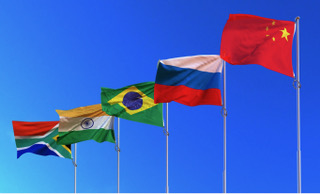With the defeat of socialism in Eastern Europe, the United States enjoyed a unilateral ability to shape the world in its own image. Countries which had struggled for national liberation in Africa, South America and Asia were forced to submit to the institutions of imperialism which had been created after the Second World War – the International Monetary Fund, the World Bank and the World Trade Organisation. States in Eastern Europe joined NATO and the remaining socialist states were forced into either a state of siege or reluctant engagement with imperialism.
This one-way trend has come to an end. It is clear that US hegemony is declining. Brazilian President Lula da Silva recently said as he visited China: “Why should every country have to be tied to the dollar for trade?… Why can’t a bank like the BRICS Bank have a currency to finance trade between Brazil and China, between Brazil and other countries?…Today countries have to chase after dollars to export, when they could be exporting in their own currencies.”
Where previously the US dollar was used as the intermediary in international trade, the Chinese Yuan, as well as other currencies, is being used increasingly. So, the world’s largest economy in purchasing power parity (China), the world’s largest energy exporter (Russia) and one of the largest economies (Brazil) have signed on to move away from the dollar.
A recent 10 billion dollar deal between China’s state-owned Chinese National Offshore Oil Company and France’s TotalEnergies is to be done through the Chinese Yuan. The Saudis have expressed their intention to join BRICS, and even India – which has tense relations with China – has indicated their intention of using non-dollar currencies in trade with Russia.
US senator Marco Rubio has expressed his horror at this changing state of affairs, saying in an interview that “there’ll be so many countries transacting in currencies other than the dollar that we won’t have the ability to sanction them.” (He believes this to be a bad thing!). Additionally, CNN broadcaster Fareed Zakaria had a recent article in the Washington Post with the headline “The dollar is our superpower and Russia and China are threatening it.”
To be clear, US power may be exposed, but it is not weak. US imperialism still has over 850 military bases, and the West is still the dominant political, cultural and economic power in the world today. The CIA is still able to interfere in almost any country in the world. Additionally, imperialism can not be reduced to just US military power. For example, in several African countries, France remains militarily and economically involved; in Asia, Japan and South Korea are acting as US proxies against China; and in the Middle East, Israel is still the US’s main ally in the region.
The positive effect of multipolarity is that it allows independent countries to adopt their own development models, outside of the Bretton Woods system. The threat of de-dollarisation was a major factor in the invasion of Iraq and the NATO overthrow of Gaddafi in Libya. However, the changing global order has meant that in the past year, popular mobilisation forced French troops out of Mali, Burkina Faso and the Central African Republic, as African states turn towards China and Russia rather than the West.
In Latin America, Nicaragua, Venezuela (despite its problems) and Cuba have emerged as the vanguard of the move against US imperialism. Brazil and Argentina have talked about developing their own currency, the Sur. China has brought peace between Iran and Saudia Arabia, which will hopefully end the horrific war in Yemen. In Asia, China has built a modern railway system in socialist Laos – still destroyed by American bombs – and US hopes to win over Vietnam seemed to have failed as that country moves towards closer co-operation with Beijing.
However, we must also remember that multipolarity is not the end in and of itself. Just because a country has been given the ability to develop outside the US-controlled order, does not mean that it will use that ability to build socialism. Far from it, in some cases. Our struggle is not just against the United States, but against capitalism. But neither does this mean adopting a liberal purism, common among Western leftists, that every country must adopt our definition of socialism or else they are the enemy.
The cracks within imperialism are growing, and it is a fact that socialism cannot be built in a world controlled and dominated by the United States or its proxies. James Connolly famously declared “Neither King Nor Kaiser”, but in practice, the 1916 Rising could not have happened without German weapons. This didn’t make the Kaiser progressive, of course, but it did show Connolly understood the need to remain principled against imperialism but also the need to have tactical sense to exploit the contradictions within it.






